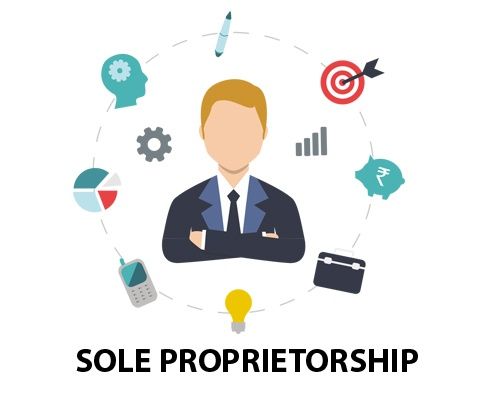A Pvt.Ltd Company Offers Limited Liability and Independent Legal Status.
Sole Proprietorship is a simple business structure owned and managed by a single individual. It offers complete control to the owner, but also carries unlimited personal liability for all debts and obligations of the business.
- Trusted by 500+ Clients Worldwide with a 4.9★ Rating

A sole proprietorship is a business owned and managed by one individual, where the owner and business are the same entity. The proprietor enjoys all profits but also bears all losses and liabilities.
In India, no mandatory registration is required, but optional registrations make the business legally compliant and offer benefits. Common ones include:
Shops & Establishment
GST
MSME (Udyam)
Trade License
Professional Tax
Import Export Code (IEC)
FSSAI (for food businesses)
- Reasons to choose
- Who Should Opt for Sole Proprietorship?
- Challenges of Sole Proprietorship:
- Minimum Requirements for Sole Proprietorship Registration:
- Documents Required for Sole Proprietorship Registration:
- Compliance Requirements:
Proof of the registered office (e.g., electricity bill, rent agreement)
Digital Signature Certificate (DSC) for directors
Request A Callback
Trusted Legal Expertise,
Loved by Clients
Custom advisory for high-impact legal, financial, and corporate decisions

Testimonials
Trusted By Clients And Industry Experts
At Prahar Filing & Advisory, our clients’ success stories speak volumes. Discover how businesses across various industries have leveraged our expertise to achieve their goals. Read firsthand accounts of our commitment to excellence and the impact we've made in supporting their growth and compliance needs.


“Prahar Filing & Advisory has been instrumental in helping us scale compliantly. Their team is proactive, detail-oriented, and always available when we need strategic input. A true partner in our growth.”
Kislay Sharma
Director, Dravanta Nexus Private Limited


“As an IT Company, we needed fast and reliable compliance support. Prahar delivered with precision — from GST registration to advisory. Their tech-savvy approach and clear communication made all the difference.”
Dhrub Kr Karmkar
Director, Xspaceweb Private Limited
“I was new to tax filing and unsure about deductions. Prahar simplified everything, explained the process patiently, and helped me file with confidence. Their service is perfect for working professionals like me.”
Rahul Kumar
IT Employee

“Prahar Filing & Advisory took care of my store’s registration and tax setup without any hassle. Their team is courteous, efficient, and always ready to help. I recommend them to every small business owner.”
Prabhakar Mandal
Proprietor, Aradhya Hardware

“I run a small business and needed help with GST and licensing. Prahar’s team guided me step-by-step and made sure I understood every part of the process. They’re reliable, honest, and truly client-focused.”
Angad Kumar
Proprietor, Kunwar Enterprises

